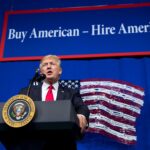J.P. Morgan has raised the probability of a U.S. recession by the end of 2024 to 35%, up from an earlier estimate of 25%. This adjustment is attributed to easing labor market pressures and concerns over escalating trade tensions. The implementation of tariffs by President Donald Trump has elevated levies on U.S. imports to their highest levels in a century, intensifying fears of an economic slowdown.
In response to these developments, Goldman Sachs has also increased its recession probability for the next 12 months to 35%, citing declining consumer and business confidence.
The financial markets have reacted strongly to the tariff announcements, with significant declines in major indices. The S&P 500 has lost over 17% from its recent high, the Nasdaq has entered a bear market, and the Dow Jones has fallen into correction territory.
Federal Reserve Chair Jerome Powell has expressed caution regarding the tariffs’ potential to significantly elevate inflation and slow economic growth. The Federal Reserve is closely monitoring the situation, with markets anticipating possible interest rate cuts in response to the evolving economic landscape.











